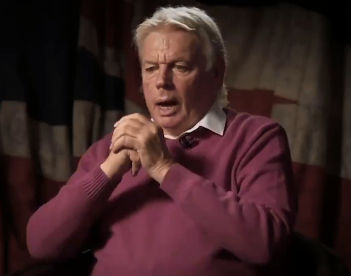
Ofcom has sanctioned London Live, the TV channel of Evening Standard and Independent owner Evgeny Lebedev, after an interview with conspiracy theorist David Icke that “risked causing significant harm to viewers”.
The broadcast regulator said that Icke’s controversial views on the causes of coronavirus and the responses of governments were not challenged enough during the 80-minute interview, which aired on 8 April.
Ofcom said today: “While we acknowledge that David Icke has a right to hold and express these views, they risked causing significant harm to viewers who may have been particularly vulnerable at the time of broadcast.”
Its biggest concern came in relation to Icke’s comments “casting doubt on the motives behind official health advice to protect the public from the virus” as the regulator noted Icke’s claims were not borne from scientific or any other evidence.
“Ofcom stresses that there is no prohibition on broadcasting views which diverge from or challenge official authorities on public health information,” it said.
“However, in broadcasting David Icke’s unsubstantiated views without sufficient challenge or context, [London Live owner] ESTV failed in its responsibility to ensure that viewers were adequately protected.”
ESTV had told Ofcom it takes the Broadcasting Code “extremely seriously” and that its efforts to be compliant had included removing anything from the interview that could have been “considered to be medical advice or contrary to government guidance”.
Ofcom’s sanction means London Live must air a summary of its findings, while it is still deciding whether to impose any further penalty, though the TV station reportedly feels this would be “disproportionate”.
A London Live spokesperson said: “London Live respects Ofcom’s decision in this case and apologises for any harm this may have caused.”
Ofcom’s decision has come within just two weeks as it prioritises cases linked to coronavirus where broadcasts may have helped spread misinformation about the illness.
Eamonn Holmes
The regulator has also issued guidance to ITV and its presenters after This Morning presenter Eamonn Holmes commented on conspiracy theories linking coronavirus to the rollout of 5G technology, including that people “don’t know it’s not true”.
Ofcom said: “In our view, Eamonn Holmes’ ambiguous comments were ill-judged and risked undermining viewers’ trust in advice from public authorities and scientific evidence.”
The seriousness of this incident, which saw more than 400 complaints sent to Ofcom, was mitigated by a “fake news” caption relating to the discussion, comments by This Morning’s consumer editor Alice Beer that the theories were “not true” and “incredibly stupid”, and the fact Holmes read out a statement on air the next day saying he wanted to “make it clear there’s no scientific evidence to substantiate any of those 5G theories”.
It has been reported that as many as 50 cellphone towers have been set alight in arson attacks because of the coronavirus conspiracy theory.
In relation to both incidents, Ofcom said: “Broadcasters have editorial freedom to discuss and challenge the approach taken by public authorities to a serious public health crisis such as the coronavirus.
“However, discussions about unproven claims and theories which could undermine viewers’ trust in official public health information must be put fully into context to ensure viewers are protected.
“These responsibilities are especially important when ongoing events – such as mobile phone masts in the UK being attacked – risk significant harm to the public.”
Picture: London Live
Email pged@pressgazette.co.uk to point out mistakes, provide story tips or send in a letter for publication on our "Letters Page" blog
